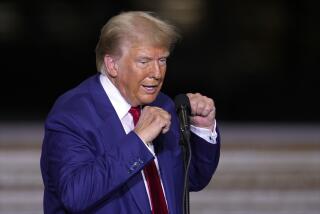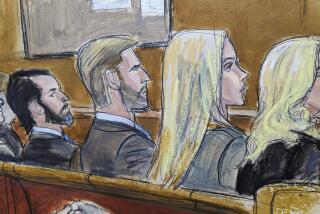Giuliani: Trump wouldn’t ‘have to’ obey a Mueller subpoena, could take the 5th
- Share via
Reporting from Washington — President Trump’s attorney Rudolph W. Giuliani, who has already roiled the White House’s legal tussle with adult-film actress Stormy Daniels, asserted Sunday that the president would not “have to” respond to a subpoena in the special counsel’s wide-ranging Russia probe.
Giuliani, who joined the president’s legal team two weeks ago, also said that if Trump does agree to be questioned, he might invoke his 5th Amendment right to guard against self-incrimination by refusing to respond to some queries.
Speaking on ABC’s “This Week,” Giuliani said Trump was under no obligation to obey a subpoena, saying “we don’t have to comply” with one.
“He’s the president of the United States,” Giuliani said. “We can assert the same privilege that other presidents have.”
He was referring to former President Clinton’s choice to resist a subpoena in connection with the Monica Lewinsky investigation, though Clinton ultimately agreed to voluntarily submit to questioning.
The combative former New York City mayor, having emerged as a key catalyst in the separate Daniels case with his unexpected disclosures and changing narratives about the president’s involvement in a pre-election hush-money payout to the porn actress, was somewhat more circumspect in addressing the investigation of Russia’s election interference and possible Trump campaign complicity.
Questions over whether special counsel Robert S. Mueller III might seek to compel Trump to testify before a grand jury intensified last week after the Washington Post reported that the special counsel had broached the possibility earlier this spring, in talks with the president’s lawyers about whether Trump would agree to a sit-down interview with investigators.
A subpoena confrontation could substantially up the constitutional ante related to Trump’s dealings with — and his possible attempts at obstruction of — the Russia investigation, which the president has repeatedly termed a “witch hunt.”
Trump reiterated last week he would “love to” sit and answer Mueller’s questions. But he said he would do so only if he were convinced that investigators were treating him fairly.
Giuliani said he would strongly advise against such an in-person encounter, however.
“I’m going to walk him into a prosecution for perjury like Martha Stewart?” he asked rhetorically, alluding to the high-profile 2004 conviction of the “domestic goddess” entrepreneur on charges of obstruction and lying to investigators in connection with an insider-trading case.
Joseph diGenova, a lawyer who is in the Trump orbit although not part of the president’s legal team, said he also would argue against an interview with Mueller. DiGenova, who said a business conflict prevented him from joining Trump’s team, on Sunday echoed the president’s recent attacks on the special counsel.
“The president will not sit down for an interview because this investigation has now reached a level of bad faith [that] this is no longer a good-faith investigation,” the onetime prosecutor said on “Fox News Sunday.”
Giuliani’s addition to the president’s legal team was part of an overhaul that not only involved the departures and arrivals of several important players, but also pointed to a far more aggressive pushback against Mueller’s investigative authority.
The challenges faced by Trump in connection with the Russia probe are being steadily amplified by the separate-but-parallel Daniels case. Trump’s onetime legal fixer Michael Cohen faces a criminal investigation after having acknowledged making a $130,000 payment to her shortly before the 2016 election that was intended to buy the porn actress’ silence about an alleged tryst with Trump more than a decade ago.
Giuliani and Trump each have offered inconsistent and contradictory explanations about when and whether the president was aware of the payment, and the underlying motives for the agreement with Daniels, whose real name is Stephanie Clifford.
The former mayor offered yet another glimpse into the netherworld of what the president’s surrogates have characterized as nuisance claims against Trump. In the ABC interview, Giuliani casually acknowledged that Cohen could have made payoffs to other women under circumstances similar to those surrounding Daniels’ allegations.
“I have no knowledge of that,” Giuliani said. “But I would think if it was necessary, yes.”
Seeking to explain why the president would authorize Cohen to make payments at his own discretion, without Trump’s knowledge, Giuliani suggested that sums such as the amount paid to Daniels were inconsequential to Trump as a way of brushing false accusations aside.
“I know this sounds funny to people there at home — I never thought $130,000 was a real payment,” he told ABC, adding: “People don’t go away for $130,000 with a meritorious claim.”
Appearing on the same program, Daniels’ attorney Michael Avenatti said he was flabbergasted by Giuliani’s freewheeling round of television appearances on Trump’s behalf, including the one on Sunday just before his own, in which Giuliani said he did not know when Trump became aware of the Daniels payment.
Last week, Giuliani, supported by Trump, said the president had reimbursed Cohen. The president subsequently said Giuliani did not have the facts straight, but Trump did not specify what was wrong with Giuliani’s account or what the truth is.
Avenatti said Giuliani “now expects the American people to believe that he doesn’t really know the facts — this guy’s all over the map over the last 72 hours on some very simple facts that should be very straightforward.”
“They are making it up as they go along,” he said. “They don’t know what to say because they’ve lost track of the truth.”
On another Sunday show, presidential advisor Kellyanne Conway defended her boss’ credibility when she was asked about documented falsehoods by Trump.
“The president doesn’t lie,” she said on CNN’s “State of the Union.”
Giuliani, in the ABC interview, posited that Trump’s comments to the news media, and by extension to the public, were irrelevant to the legalities of the case.
“I don’t know when the president learned about it,” he said, referring to the payment to Daniels. “These are not facts that matter to me as a lawyer. Those don’t amount to anything, what’s said to the press — that’s political.”
Twitter: @laurakingLAT
More to Read
Get the L.A. Times Politics newsletter
Deeply reported insights into legislation, politics and policy from Sacramento, Washington and beyond. In your inbox twice per week.
You may occasionally receive promotional content from the Los Angeles Times.










